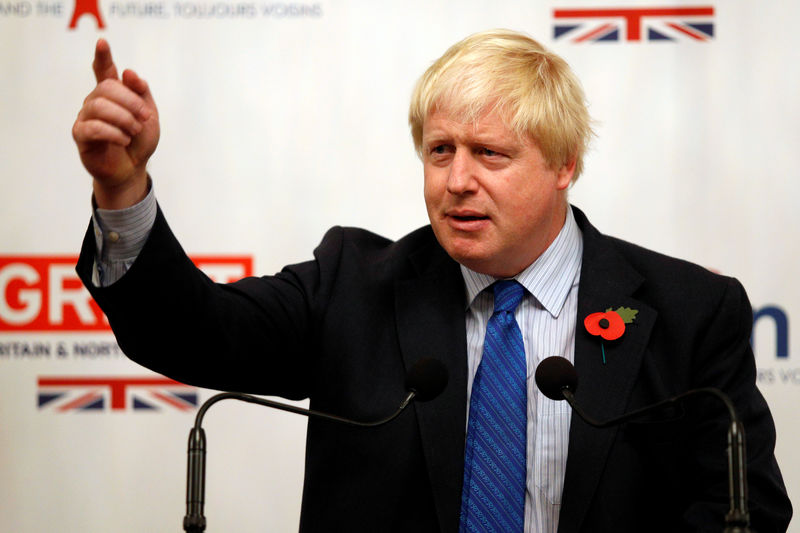(Bloomberg) -- Boris Johnson refused to rule out suspending Parliament in order to force a no-deal Brexit, in a direct challenge to lawmakers trying to find a way of stopping the next British prime minister from from leaving the European Union without a deal.
It would be an “absolute folly” to tell the European Union that no deal is no longer an option, so proroguing Parliament should remain available, the front-runner to replace Theresa May said Thursday evening.
Johnson has pledged that if he wins the Conservative Party race to become prime minister, he’ll ensure Brexit happens by Oct. 31 “do or die.” He’s said he’ll take the U.K. out of the bloc regardless even if he fails to negotiate a deal that Parliament approves by that deadline.
“I don’t particularly envisage the circumstances in which it would be necessary to prorogue Parliament, nor am I attracted to that expedient,” he said, while maintaining that all options remained on the negotiating table.
Maneuvering
Johnson has taken turns trying to appeal to both hardline Brexiteers and moderate Conservatives. On Wednesday he said the chances of a no-deal exit were “a million to one against.” Asked again Thursday if he stood by that comment, he said yes.
Jeremy Hunt, Johnson’s opponent in the contest for 10 Downing Street, on Thursday said he “deplored” MPs who voted to block a no-deal exit, and that he’d resign as prime minister if he couldn’t deliver Brexit. He also said he’d whip all of his cabinet members to vote to keep no deal as an option.
But there’s little evidence the new prime minister would have enough support from colleagues to deliver a no deal exit. On Thursday, May signaled she might be willing to oppose her successor if he tries to force that outcome.
Prorogation is a tool usually used by prime ministers as a formality to dissolve Parliament for a few days in order to start a new session. But now some Brexiteers, including former leadership contender Dominic Raab, have suggested using the procedure to suspend Parliament to stop MPs voting against a no-deal situation at the end of October.
Speaking to reporters on her way to the Group of 20 summit in Japan, May declined to promise she will follow the orders of Johnson or Hunt in votes on Brexit policy. She has already voted against leaving the EU without an agreement, arguing it would disrupt trade and damage the economy.
Conservative members of Parliament on Thursday were organizing another attempt to prevent the U.K. exiting the EU without a deal. Former Chancellor of the Exchequer Ken Clarke said he’ll back a measure that would shut down parts of government spending in the event of a no-deal Brexit.
The amendment, put down by former Attorney General Dominic Grieve, would cut off funding to some departments if the government takes the U.K. out of the EU with no deal unless it first gets Parliament’s approval.
Johnson also tried to play down the economic risks of a no-deal exit, saying that warnings of food shortages and disruption to flights were “nonsense.”
“The planes will fly, there will be drinking water whatever happens on Nov. 1 in this country, and there will be milk solids and glucose and whey for our Mars Bars,” he said, without giving any details of how he would ensure supplies. “Where there’s a will, there’s a way.”
Food industry experts last year warned the government that makers of the chocolate bar could be forced to halt production in a hard Brexit scenario and the price of confectionery could rise drastically.
